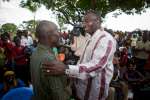UNHCR starts new season of returns from Botswana to Angola
News Stories, 15 July 2005

HUAMBO, Angola, July 15 (UNHCR) – For years, Dominga Arture sat in this desolate corner of Botswana and watched her friends leave for their homeland in South Africa and Zimbabwe.
"I remember the longing I felt when the South Africans left in the early '90s. My only consolation was the words my parents instilled in me, that one day, it would be my turn too," she said. "Now the time has come. I am very excited. It is the first time I'm leaving Botswana and the camp, and returning to the country of my birth."
Arture was among the first Angolan refugees to be airlifted home from Botswana's Dukwi camp as UNHCR started the latest – and last – season of repatriation to Angola this week. Returns had been suspended in October last year because of the rainy season. Since the resumption of flights this week, a total of 115 refugees have returned to Huambo province in central Angola.
Many of the Angolans at Dukwi camp have been here for a long time. "I arrived in Botswana with my parents in July 1980 when I was only four years old. I have lived here for 25 years now and never been anywhere else. My education, marriage, the birth of my children, all took place in the camp," said Arture, shaking her head in disbelief.
For her, returning to Angola with her immediate family was a dream come true. But her feelings were mixed, as she had to leave her parents, eldest son and nine siblings for the first time. Leaving Dukwi also meant an end to her involvement as an active, visible and vocal member of the Angolan community in the camp.
For many years, Arture had been an important link between her community and UNHCR, and convinced many people that return was a viable option.
"Initially, this wasn't easy," said Lisa Palmer, UNHCR's community services officer. "The community was divided on repatriation. A workshop for both groups was held, promoting peace and reconciliation. This proved critical in dismissing fears and false expectations about returning home, reuniting the divided groups. Dominga was one of the participants and took what she learnt to every Angolan household in the camp."
Arture explained, "Even though I was too young to remember anything about Angola when I arrived in Botswana, my parents kept alive their memories of our country for me and my siblings. They always told us that one day the war would end and we would return to our motherland, meet our relatives and become a family in the true African sense. This is what my parents wanted for us as their children, and through the teachings of the older members of our community, it is what I desire for my children and all Angolan children born in Botswana."
Arriving back in Angola, Arture and other returnees were received in UNHCR's new reception centre in Huambo, from where most of them will eventually be transported home by UNHCR's partner, the International Organization for Migration, via the Kuvango river through Cuangar, Calai, Dirico and Mucusso to Kuango Kubango.
UNHCR and other agencies provide returnees with a two-month pack of food rations and supplements to tide them over until their first harvest. The refugees are also given vocational training and crop-farming skills to enable them to become economically productive and to reach a basic level of subsistence as soon as possible.
Return is not easy to all areas in Angola as the country is still heavily mined. Before returning home, refugees receive mine-awareness training courses in the camps. UNHCR discourages return to heavily-mined areas, but cannot stop those wishing to return from doing so.
Arture is under no illusions about what she is likely to find in the rural community she is going to settle in.
"I expect to find many people who are not formally educated. I really want to help to educate my people, teach them English, which is important. I also intend to teach English to these children leaving today, as well as the children where we are going to settle, until such time when they are enrolled in schools."
She added, "Eventually, I would like to further my studies but I will also continue my community functions, educating the community, sharing information I learnt at the HIV/AIDS workshop I attended in Dukwi and to spread the information I learnt on peace and reconciliation."
Some 318,000 Angolan refugees have returned home since 2002 – more than 185,000 of them with UNHCR help in the form of transport or assistance packages. The majority have come back from the Democratic Republic of the Congo, Namibia and Zambia.
In Botswana, some 420 out of 2,000 Angolan refugees have signed up for return to Angola this year. Road convoys from Dukwi camp to Angola's southern Kuando Kubango province are expected to start within weeks.
UNHCR will conclude the two-year organised repatriation operation to Angola at the end of this year.
By Pumla Rulashe and Maria Benavides













































